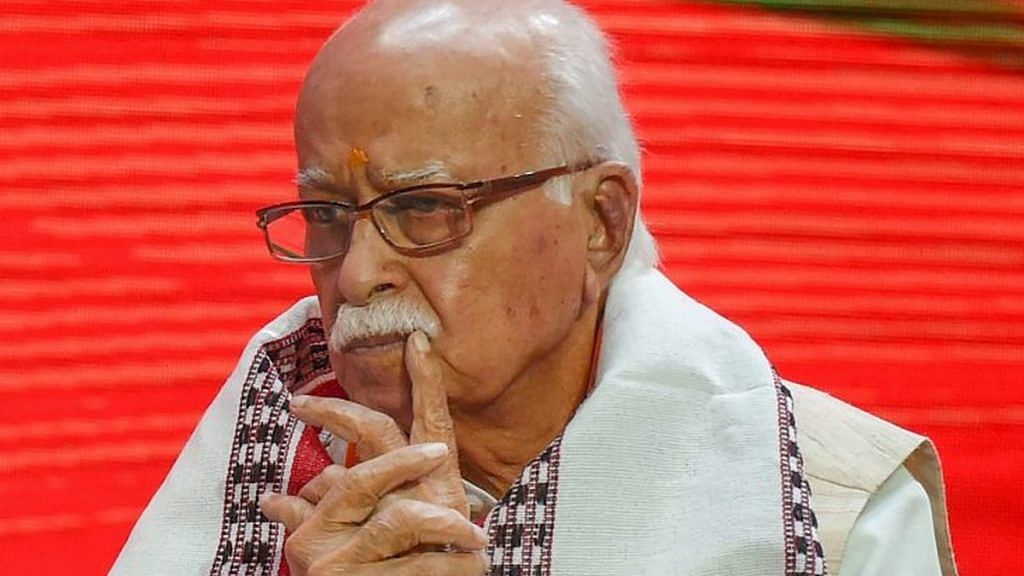L.K. Advani, who turns 91 today, defines an era in BJP which saw it rise from a mere two seats in Lok Sabha to 282 in just a span of three decades.
New Delhi: From the ‘iron man’, a key cog in the BJP machinery, to a ‘margdarshak’ in his political twilight — Lal Krishna Advani’s journey in the BJP has been marked by several high and lows.
Born in Karachi in a Sindhi family, the greatest regret for Advani — who turns 91 Thursday — will, perhaps, remain the elusive prime minister’s chair — the only missing element in his long and eventful political voyage.
Like most seasoned BJP leaders, Advani’s political origins lie with the RSS, BJP’s parent organisation, which he joined in 1941 as a young boy.
Association with RSS and Jana Sangh
Forced to migrate to Delhi after Partition, Advani became an RSS pracharak in Rajasthan. He joined the Bharatiya Jana Sangh, BJP’s predecessor, when it was formed in 1951 and was a pivotal wheel along with Atal Bihari Vajpayee when the BJP was formed in 1980.
Ironically, it is the very soft-spoken, mild mannered Advani who became the face of BJP’s aggressive, combative and audacious Hindutva. Together with Vajpayee, he went on to build the BJP brick by brick and orchestrated its steep rise in the 1990s.
The Vajpayee-Advani duo was a well-crafted, carefully thought out blueprint. If Vajpayee was the moderate, Advani was the hardliner. If Vajpayee was the romantic, the poet, Advani was the ‘iron man’. And if Vajpayee was the statesman, Advani was the street politician.
Also read: Sorry Shashi Tharoor, you can’t give a clean chit to L.K. Advani in Ayodhya violence
Ram Janmabhoomi movement
A 10-term parliamentarian, Advani became the face of the Ram Janmabhoomi movement that shaped, and continues to define, the BJP’s electoral and political fortunes.
The BJP patriarch, who has also served as the home minister and deputy prime minister, has been a key figure in the party’s evolution, with a profile and prominence no less than that of former PM Vajpayee. However, Advani’s political journey has been far from smooth, intercepted by uneasy, and even hostile, phases.
In the mid-1990s, as the Jain Hawala case erupted, the role of several leaders, including Advani, came under the scanner. Although his name was later cleared by the Supreme Court, the scandal was an embarrassing and turbulent phase. It is, however, his chequered relationship with the BJP that perhaps marks the biggest lows of his political life.
The Jinnah remark
In 2005 — during his third term as BJP president, Advani visited Pakistan in what turned out to be an eventful trip. He shocked many by praising Muhammad Ali Jinnah during the trip, earning the wrath of the RSS as well as sections of his party, and was forced to resign as party president following the furore.
This came just a year after a smug BJP suffered a drubbing at the hustings in the 2004 Lok Sabha polls, for which a major part of the blame went to the Vajpayee-Advani duo who had decided to advance the polls in a moment of overconfidence.
Also read: Narasimha Rao felt betrayed over Babri, he avenged it by trapping Advani in hawala scandal
Decline in political career
Ahead of the 2009 general elections, many in the BJP were unhappy with Advani projecting himself as the PM candidate, but the veteran leader made his bid. A resounding defeat to the Congress-led UPA in the polls severely dented Advani’s stature, image and position within the party. But little did he know that by the next Lok Sabha polls, his irrelevance in the party would be complete.
Advani, who had hoped to give the PM race another shot in the run-up to 2014, was beaten by his one-time protégé — Narendra Modi. Tensions between the Advani and Modi camps were no secret, and the strained relations made for spicy political stories in the front pages of newspapers.
Modi won the 2014 polls with a stunning mandate and relegated Advani to the margdarshak mandal along with other veteran leaders such as Murli Manohar Joshi, a subtle but emphatic way of conveying that he would no longer be part of BJP’s active politics and will serve as a ‘guide’.
A self-professed lover of books, cinema and theatre, Advani has a side to him which runs completely contradictory to his combative political style.
As he turns 91, the hardened politician defines an era in the BJP which saw it rise from a mere two seats in the Lok Sabha to 282 in just a span of three decades.
